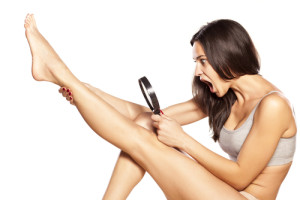 Unfortunately, it’s somewhat difficult to tell the difference between athlete’s foot and eczema. In many cases, only your family doctor or dermatologist can make the correct determination.
Unfortunately, it’s somewhat difficult to tell the difference between athlete’s foot and eczema. In many cases, only your family doctor or dermatologist can make the correct determination.
The reason for this is the fact that both of these skin conditions have the same symptoms. What makes it more confusing is that tinea pedis, the medical name for athlete’s foot, sometimes presents itself on other areas of the body.
Symptoms of both conditions include:
- Scaly skin with red patches
- Blisters
- Cracked skin
- Itching or burning skin
Many doctors agree that, in some instances, the only way to determine which condition an individual has is to study their skin scrapings under a microscope.
Athlete’s Foot
Athlete’s foot is contagious. It’s either acute or chronic. This skin condition is caused by a bacterial infection. Because fungi thrives in dark (damp) places, wearing shoes and socks creates an excellent environment for fungus to grow.
If you are experiencing symptoms between your toes or have crumbly nails, chances are you have tinea pedis. Other common places for an outbreak to appear is on the hands and the groin area.
Since this skin problem is contagious, it’s extremely important to start treatment as soon as you notice the first subtle signs. The last thing you want is for it to spread to other family members.
Eczema
Eczema is not contagious. Like tinea pedis, it can be either acute or chronic. This skin condition is a result of irritation, allergies or even emotional stress. If the skin on top of your foot and toes is red, you probably have eczema.
Eczema patches can appear anywhere on the body. If you notice red patches on your feet, without accompanying blisters or other signs of athletes foot, you may just be allergic to the material that your shoes and socks are made of.
In the chronic stage, of both of these skin problems, it’s typical to experience oozing and more pronounced itching and burning sensations.
Don’t hesitate to get professional help in determining whether you have tinea pedis or eczema. If you’re not exactly sure what you’re dealing with, it’s much better to get a doctor’s opinion.
The last thing you want to do is ignore the situation in hopes that the issue goes away on its own. Whether you’re dealing with athlete’s foot or something else, it won’t go away on its own. Unfortunately, it only spreads and gets worse.
Click the following link if you’re unsure if you have athlete’s foot or eczema.


